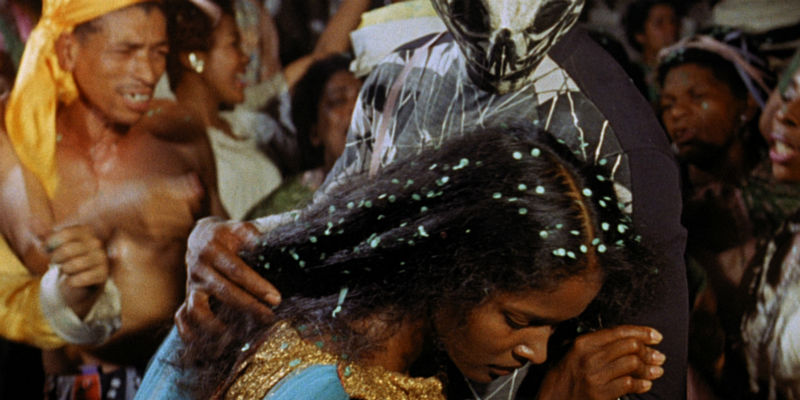Last year the entire world was pointing fingers at the Oscar competition for being too white, with black artists like Will Smith and Spike Lee even boycotting the event. It must be so refreshing to live in Brazil, a nation that proudly embraces its blackness, exuding melanin through Carnival and samba. The largest country in Latin America is home to the film Black Orpheus, an adaptation of the Greek tragedy to a nearly all-black community in Rio de Janeiro. Spike Lee himself picked the classic from 1959 as one of the 87 films every aspiring filmmaker must see. Brazil must be a role model for black cinema, right?
DMovies begs to differ.
There is a large disconnect between the perceived colour of Brazil abroad and on Brazilian soil. While most of the world sees Brazil as a largely black nation, the majority of Brazilians (and by extension the Brazilian media and Brazilian cinema) refuse their black heritage, and consistently deny blacks a prominent role in society as well as on the silver screen. In other words, foreigners see Brazil as black and exotic, while most Brazilians (particularly the middle and upper classes) vehemently refuse to identify themselves as black.

The black sheep
Black Orpheus is a very unusual film because – despite critical and commercial acclaim – it feels very foreign to Brazilians. The French-Brazilian co-production was directed by French filmmaker Marcel Camus and it feels unnatural, contrived and difficult for Brazilians to relate. The film was entirely made on Brazilian soil and nearly all the actors and scenography are Brazilian, but it still feels very European or even American. This is because of the French director’s foreign gaze.
This is not to say that Black Orpheus is a bad film. The movie has outstanding qualities, such as the astonishing cinematography of the favelas, the mountains, the beach and Carnival of Rio de Janeiro. The images are plush, vibrant and almost dreamlike, without being cheap and vulgar. The music score is at once soothing and energetic, composed by the Brazilian musicians Antônio Carlos Jobim and Luiz Bonfá. These songs have since become Bossa Nova classics.
The movie is based on the play Orfeu da Conceição by the Brazilian poet Vinicius de Moraes, which is an adaptation of the Greek legend of Orpheus and Eurydice, set in the modern context of a hilltop shanty town in Rio de Janeiro during Carnival. Orfeu (Breno Mello) is engaged to Mira (Lourdes de Oliveira), but he falls in love with a countryside girl called Eurydice (Marpessa Dawn), who arrived in Rio in the build-up for Carnival. She is fleeing from a man who is trying to kill her, and she soon also has to face the fury of jilted fiancee Mira. She then disappears, and Orfeu sets off to find her.
At the end of the film, Orfeu communicates with Eurydice in a Umbanda ritual. The young female, who turns out to be dead, talks through the mouth of a possessed female shaman in a beautifully staged religious ceremony. Umbanda rituals are profoundly marginalised and viciously frowned upon in Brazil.
Samba, Carnival, beach, the Sugar Loaf, boisterous people: all the clichés of Brazil are present in Black Orpheus. People are dancing and prancing to the unrelenting sound of guitars, drums and cuícas. Everyone is happy and sensual, and smiling is almost compulsory. The film has a joie de vivre and naivety akin to Jean Renoir’s French Cancan (1954) and perhaps to Hollywood musicals. Brazil is a an exotic country to be relished and savoured, and the movie is an enjoyable experience throughout, even if at times the music feels repetitive.
Nearly all characters are black in Black Orpheus. Sadly, the thought of an all-black Brazil makes most Brazilians cringe. While warm and welcoming on the surface, Brazil is a deeply racist country.

Racism is subtle but widespread
Spike Lee once said that “the United States is 20 years ahead of Brazil when it comes to ending racism.” Brazilians of mixed heritage tend to affiliate themselves to their white side, which the American writer Robert Stam calls the “whitening” tendency. Had Obama been born in Brazil, he would likely identify himself as white.
Brazilian black actor and cinema veteran Antônio Pitanga recently claimed that the black family is never represented in the Brazilian media and cinema. Instead, flat characters and stereotypes (such as the black singer, the black footballer, the black maid, etc) sparsely populate Brazilian films and soap operas. Black religions, such as Umbanda, suffer from even more discrimination.
The Brazilian submission to the Oscars last year The Second Mother (Anna Mulayert, 2015) has also been accused of racism. The film sets to uncover classism, discrimination and lack of social mobility in Brazil. Despite the social denunciation tone, the absence of black characters is conspicuous throughout the movie.
Unsurprisingly, none of the actors in Black Orpheus had much of a career after the film, and most fell into oblivion. Mello acted in a few films in the 1960s, but very few Brazilians would recognise his name. DMovies hazards a guess that these actors would have been much more successful if they had pursued a career outside Brazil.
Today is the first day of Brazilian Carnival, the largest street party in the world. The festivities are European in their roots, but deeply black in their heart. Let the world remember Black Orpheus, Samba and Tom Jobim not just this week, but also after Carnival. Let the world celebrate Brazil’s blackness and multi-ethnicity. Let’s also hope that Brazilians join in.
…
This piece was originally published in February 2016, during the launch of DMovies. It has now been republished in order to celebrate the rerelease of Black Orpheus.
Just e-mail us the name of the director of Black Orpheus at info@dirtymovies.org in case you wish to win three DVDs/Blu-rays and soundtracks of the movie (UK only) – courtesy of the Criterion Collection.








